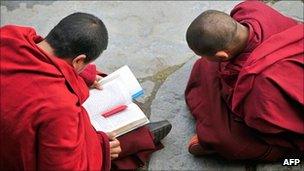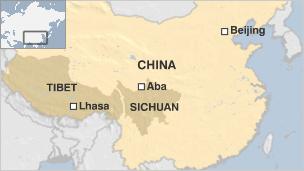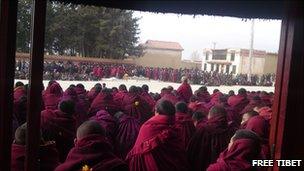Self-immolation 'trend' at restive Tibetan monastery
- Published

Many young men study at monasteries in ethnic Tibetan areas outside Tibet
A Tibetan monk has set fire to himself - the fifth one this year - in an apparent indication of the escalating tension between Tibetans and the Chinese government.
The 17-year-old, named as Kelsang Wangchuk, was reported to have been carrying a photograph of the Dalai Lama as he set himself alight.
This is the latest in a series of incidents this year at the Kirti monastery, in Aba County - called Ngaba in Tibetan - in Sichuan province.
As well as the self-immolations, there has been a stand-off between residents and the security forces, and a row about a group of monks sent for re-education - an incident that even drew comment from the United Nations.
China has reacted by tightening security at the monastery, launching a series of criminal prosecutions and criticising the behaviour of some monks.
But it still appears to be struggling to assert its authority in at least this one Tibetan area.
'Worrying trend'
News of the latest self-immolation came from campaign groups with contacts in the area.
The US-based International Campaign for Tibet said the monk had set himself on fire on Monday as he shouted slogans against the Chinese government.

China's state-run Xinhua news agency confirmed the incident had taken place, saying the police had immediately extinguished the flames. The monk had only slight burns to his leg, according to Xinhua.
Another campaign organisation, Free Tibet, based in London, also reported the incident.
"A growing number of Tibetans clearly feel that this is the only way that they can be heard," said Stephanie Brigden, the director of Free Tibet.
This is the fifth case of self-immolation in Tibetan areas of western Sichuan province this year, something Ms Brigden described as a "worrying and absolutely unprecedented" trend.
Thubten Samphel, a spokesman for the Tibetan government-in-exile, said Tibetan Buddhism did not accept violence against other people or oneself.
"Whatever the reason for this, it's a very strong and desperate indication that the people there are totally unhappy," he said from the government's base in Dharamsala in India.
'Know nothing'
It is not easy, though, to understand even what is going on in and around the Kirti monastery, let alone why it is happening.
Kirti has a sister monastery in Dharamsala, and the two sets of monks keep in touch using mobile phones.
"It seems the monastery is under heavy police and military surveillance," said Thubten Samphel, adding that reports had come from this informal network between the two monasteries.
But, in an indication of just how patchy those links can be, he said the government-in-exile learnt about this latest self-immolation only through international news reports.
Telephone calls to the monastery and surrounding town glean little more in the way of information about what is going on in the area.
Workers at hotels and businesses on Tuesday told the BBC they knew nothing about the monk who had set fire to himself.
A person who answered the phone at the monastery was equally unhelpful. "I don't know anything about it," he said.
The Chinese government usually restricts journalists' visits to sensitive Tibetan areas - something the US government has recently complained about - so it is difficult to get on-the-ground information.
And officials are almost always reluctant to talk openly about such incidents.
"Police are investigating the man's motives," was the curt comment in the Xinhua report about why this latest monk should feel impelled to set himself alight.
Prosecutions
But the Chinese government has not been passive - it has attempted to counter the discontent being displayed at the Kirti monastery.

Access to Kirti monastery is restricted but this image of a monk's funeral was sent to campaigners
In August it sentenced three monks to lengthy prison sentences for helping another to kill himself through self-immolation in March.
And earlier this year it ordered the "legal education" of monks at the monastery, an incident, among others, that resulted in queries from the UN High Commissioner for Human Rights.
It wanted to know what was going on at the Kirti monastery and surrounding area.
The Chinese government gave perhaps its fullest justification yet for its actions at the monastery in its reply to the UN.
It accused the monks there of long being engaged in acts "aimed at disturbing social order", including vandalism and self-immolation.
"Some monks of the monastery also frequented places of entertainment, prostitution, alcohol and gambling, and spread pornographic CD-Roms," said the official document from May this year.
China told the UN that forcing the monks into re-education was a "showcase" of how to manage religious affairs.
Many at Kirti monastery appear to disagree with that view.
- Published28 September 2011
- Published31 August 2011
- Published29 August 2011
- Published26 August 2011
- Published15 August 2011